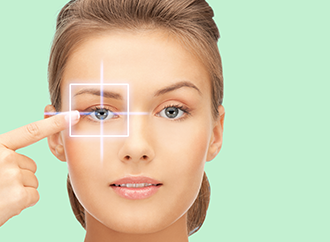
Frequently Asked Questions
- Will my eyes be corrected completely if I have laser surgery? Can my diopter values change again after the surgery?
The purpose of laser surgery is to help you get rid of your glasses and have the same vision. 0.5 and lower diopters don’t require wearing glasses and are therefore considered to indicate a successful surgery. If the laser surgery is performed while the diopter values are still increasing, glasses may become necessary again. That’s why the person’s vision should be stable for at least 1 year. 95% of myopic people and 70% of hyperopic people don’t need to wear glasses after a laser surgery.
- Can a person have a cataract operation after laser surgery?
Laser surgery neither prevents nor results in a future eye treatment (including cataract surgery).
- How do laser types change? How can I find out which type of laser is suitable for me?
Laser surgeries are determined based on the person’s eye structure and diopter values. Individuals whose preoperative checks show that they are suitable for a laser surgery are treated by laser treatment methods which are most appropriate for their eye structure and will achieve a high level of success.
- How long does a laser surgery last?
A laser surgery is completed in a short time of about 5-10 minutes.
- Does bleeding occur in a laser surgery?
Bleeding doesn’t occur in laser treatment since it is administered in the cornea, an eye tissue without veins. Laser treatment is also painless since it is performed under topical anesthesia (eye drop).
- Is any pain felt after laser surgery?
The patient can experience pain, stinging or watering in the eye for up to 6 hours following a laser surgery which involves forming a flap in the cornea as the first step, as in Intralase-LASIK and LASIK. There can be pain for 2-3 days after a laser surgery which involves detaching the eye surface as in LASEK and PRK. A protective contact lens can be placed in the eye after the laser operation to lessen this pain.
- They say that people have eye dryness after a laser operation. Is it true?
- I have low diopter values; can I still have laser surgery?
Everyone who needs glasses or no longer wants to wear them can have laser surgery regardless of their diopter values if their eye structure is suitable for the surgery.
- Astigmatism cannot be corrected by laser, right?
Laser treatment is administered to correct astigmatism besides myopia and hyperopia.
- What are the points of consideration after treatment?
- Eyes don’t need to be covered with bandages after surgery.
- The eye drops prescribed by the doctor should be used meticulously and as instructed by the doctor.
- It is an important detail that the patient avoids tampering with the treated eye and taking a shower for the first 24 hours.
- You can return to your normal life 24 hours after the operation.
- A mild stinging or watering in the eye is normal during the first few hours.
- The doctor should be visited for regular checks after the treatments.
- When can patients return to their normal routine?
They can usually go back to work the next day. It is as important as the operation itself that you take your medications regularly and as instructed by your doctor. We recommend that you wear sunglasses since sunlight can be bothersome. You can participate in all sports and social activities including walking, cycling and aerobics. You can travel by plane. However, you should avoid swimming in a pool or in the sea for approximately 20 days to prevent infection. After the first month, you can start using color lenses for cosmetic purposes if you like.
- Can a person have a laser surgery twice?
The target of the laser treatment is to reduce the diopter degrees of the eyes to the level of + / - 0.50. Depending on your diopter values, this target is achieved with a success rate of more than 90-95%. If the degree of your eyes is found to be undercorrected in the check performed at least 6 months following the first operation, then all of the examinations and analyses are repeated.
Pachymeter, Orbscan and Topolaser assessments are made to see if the corneal thickness and diopter values are suitable for a second laser surgery. If they are found to be suitable, the second laser surgery may be performed without forming a new flap and lifting the first flap instead. It is completely acceptable for the treatment to be repeated this way.
Prepared by the Dünyagöz Hospital Editorial Board.
*Page content is for informational purposes only. Consult your doctor for diagnosis and treatment
Last Update Date: 13.02.2023






